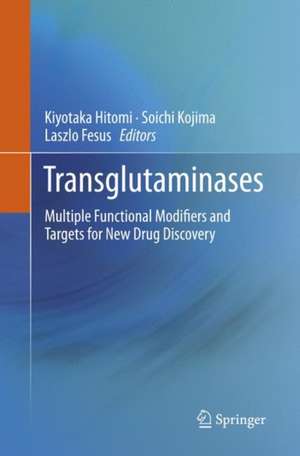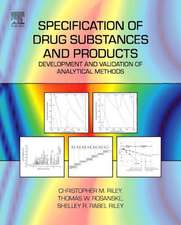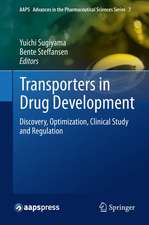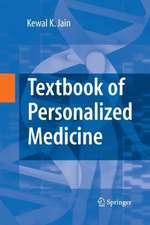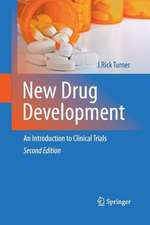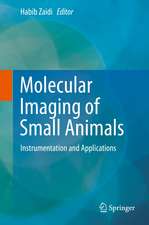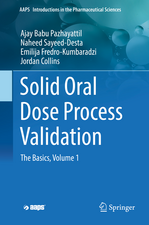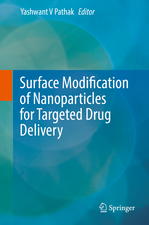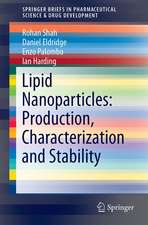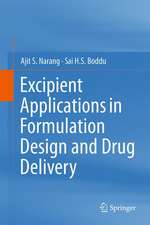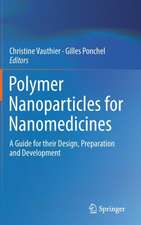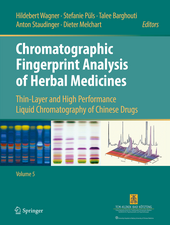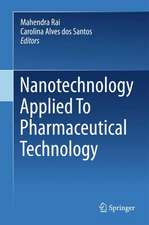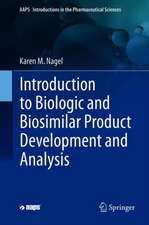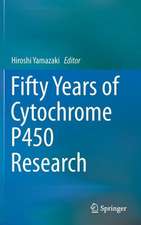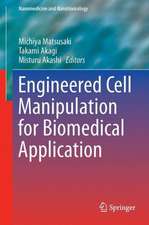Transglutaminases: Multiple Functional Modifiers and Targets for New Drug Discovery
Editat de Kiyotaka Hitomi, Soichi Kojima, Laszlo Fesusen Limba Engleză Paperback – 31 mar 2018
| Toate formatele și edițiile | Preț | Express |
|---|---|---|
| Paperback (1) | 792.49 lei 38-44 zile | |
| Springer – 31 mar 2018 | 792.49 lei 38-44 zile | |
| Hardback (1) | 813.92 lei 38-44 zile | |
| Springer – 17 feb 2016 | 813.92 lei 38-44 zile |
Preț: 792.49 lei
Preț vechi: 1042.74 lei
-24% Nou
Puncte Express: 1189
Preț estimativ în valută:
151.64€ • 158.75$ • 125.47£
151.64€ • 158.75$ • 125.47£
Carte tipărită la comandă
Livrare economică 01-07 aprilie
Preluare comenzi: 021 569.72.76
Specificații
ISBN-13: 9784431567035
ISBN-10: 4431567038
Pagini: 391
Ilustrații: VIII, 391 p. 85 illus., 37 illus. in color.
Dimensiuni: 155 x 235 mm
Ediția:Softcover reprint of the original 1st ed. 2015
Editura: Springer
Colecția Springer
Locul publicării:Tokyo, Japan
ISBN-10: 4431567038
Pagini: 391
Ilustrații: VIII, 391 p. 85 illus., 37 illus. in color.
Dimensiuni: 155 x 235 mm
Ediția:Softcover reprint of the original 1st ed. 2015
Editura: Springer
Colecția Springer
Locul publicării:Tokyo, Japan
Cuprins
1 Structure of Transglutaminases. Unique Features Serve Diverse Functions.- 2 Control of Tg Functions Depending on their Localization.- 3 Preferred Substrate Structure of Transglutaminases.- 4 Insights into Transglutaminase 2 Function Gained from Genetically-Modified Animal Models.- 5 Tranglutaminase in Invertebrates.- 6 Formation of Integrin-Binding Site on Polymer of Transglutamination.- 7 Transglutaminase 2-Mediated Gene Regulation.- 8 The Role of Transglutaminase Type 2 in the Regulation of Autophagy.- 9 Transglutaminase 2 and Celiac Disease.- 10 Transglutaminase ii and Metastasis: How Hot is the Link?- 11 Transglutaminases: Expression in Kidney and Relation to Kidney Fibrosis.- 12 Transglutaminases in Bone Formation and Bone Matrix Stabilization.- 13 Transglutaminases and Neurological Diseases.- 14 Transglutaminase; Mechanism by Oxidative Stress.- 15 Blood Coagulation Factor Xiii : A Multifunctional Transglutaminase.- 16 Inhibition of Transglutaminase.- 17 Substrate Engineering of Microbial Transglutaminase for Site-Specific Protein Modification and Bioconjugation.
Textul de pe ultima copertă
This book presents basic and extensive information on the physiological and pathological significance of the protein-modifying enzymes, transglutaminases, which are involved in multiple biological events by catalyzing a unique and important posttranslational modification reaction, cross-linking of proteins, and interacting with a large number of proteins inside and outside of cells. Although several of their essential physiological roles have been revealed, many unknown and so far not fully understood functions have remained. In humans, there are eight active isozymes having distinct tissue and subcellular distribution patterns with different substrates and physiological roles. Accordingly, aberrant regulation of the enzyme reactions or expression may lead to or has been implicated in various pathologies including neurodegeneration, fibrosis, cancer, inflammation, celiac disease, and hemostasis disorders.To provide those who are new to the field with basic knowledge and recent information on transglutaminase structures and reactions, the mechanism by which transglutaminases modify substrate proteins and their contributions to multiple biological phenomena as well as disease phenotypes, the publication of the present transglutaminase book was planned, to consist of review articles by 17 expert investigators working in this exciting area of research. The book contains detailed information related to several transglutaminases from aspects in chemical and cellular biology, medical sciences, and biotechnology that will also supply starting points for drug discovery. Although many prominent findings have been published in recent years, this type of comprehensive review book has been missing in the scientific literature. This volume will be useful for investigators who either currently work on or will start addressing transglutaminase-related research, and beyond that, for a broad audience in the scientific community.
Caracteristici
Provides detailed descriptions of basic knowledge and recent findings on the structure, mechanism of action, physiological significance, and pathological implications of transglutaminases Provides hints and seeds for clinical diagnostics and possible drug developments based on the related diseases Introduces principles and explanations of several recent techniques for newcomers to begin studying transglutaminase: structure analysis, assays, use of specific inhibitors, detection of localization, and biological activities Includes supplementary material: sn.pub/extras
